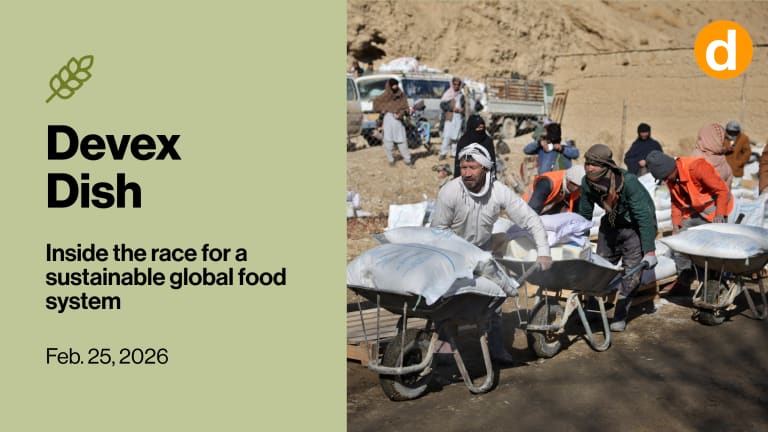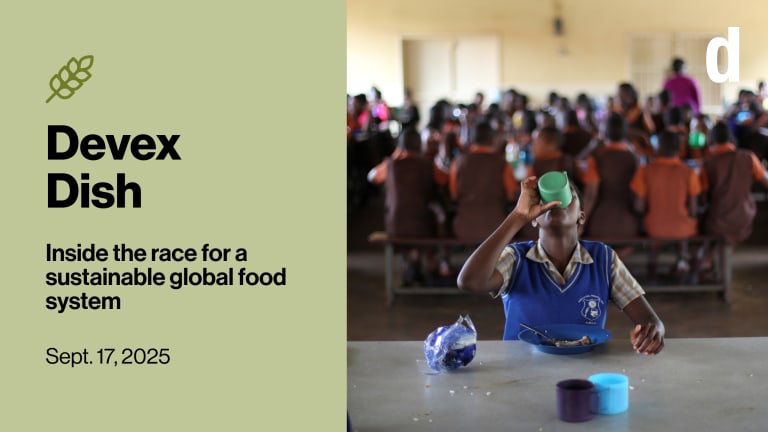Devex Dish: How international norms against weaponizing starvation eroded

When it comes to the laws of war, deliberately starving civilians is supposed to be off the table. But that international norm appears to be slowly eroding – as evident in conflicts from Gaza to Yemen to Ukraine to Afghanistan to Sudan to Syria.
This is a preview of Devex Dish
Sign up to this newsletter to get the inside track on how agriculture, nutrition, sustainability, and more are intersecting to remake the global food system in this weekly newsletter.
Let’s zoom in on Yemen: For months, the Biden administration has stored some 60,000 metric tons of wheat in warehouses in the United Arab Emirates. The food — originally destined for millions of hungry Yemeni civilians in territory controlled by Iranian-backed Houthi rebels — is now a bargaining chip in a high-stakes United Nations negotiation over who gets to decide how aid is distributed, writes Devex U.N. correspondent Colum Lynch.
The United States’ move is aimed at giving the World Food Programme leverage as it tries to persuade the Houthis to relinquish some control over how aid is delivered in its territory and permit the U.N. to refine its list of beneficiaries to ensure that food goes to those with the greatest need. Meanwhile, in December, WFP, frustrated with the pace of talks, suspended a general food program that once targeted more than 9 million people in northern Yemen — though it continues its nutrition and school feeding programs. But the cut in wheat, oil, and other staples has exacted a high cost for millions of Yemeni civilians, who have been left hungry in the middle of this geopolitical food fight.
The crisis in Yemen reflects a broader trend of food and hunger being weaponized by combatants and factored into diplomatic or humanitarian negotiations. Attacks on food are being brazenly carried out by major powers such as Russia and Israel.
“The Golden Age of humanitarianism was from 1990, with the collapse of the Soviet Union, until a few years ago,” Andrew Natsios, a former USAID administrator and an advocate of decoupling food assistance from diplomacy, tells Colum. “The norm is eroding and I think great power politics is playing a role in that, and it’s going to be increasingly difficult for us to enforce these rules.”
But others say the legal frameworks around starvation as a weapon have always been too weak, leaving civilians at the mercy of combatants.
“In the laws of war, you’re allowed to starve your adversary, but you’re not allowed to starve civilians in an international conflict,” says Michael Fakhri, an Oregon University law professor who serves as the U.N. special rapporteur on the right to food. But he points out: “If you’re going to starve your adversary, you’re inevitably going to starve civilians.”
“I’ve heard some diplomats say off the record ‘Look, we all use food as a weapon,’” he adds.
Israel’s war in Gaza — in which the entire population of some 2.2 million people is on the brink of famine — has proven particularly awkward for the White House, providing ammunition to critics who contend Washington’s commitment to the cause depends on who is doing the starving.
Read: Food as a weapon of war in the new age of starvation
Related: Why famine is 'inevitable' in Gaza — and what's next
Background reading: Charities blast World Food Programme plan to halt Yemen food aid
Say hello!
This week we’re at the annual South by Southwest, or SXSW, confab in Austin, Texas, where Devex Executive Vice President Kate Warren is speaking tomorrow, March 14, at Food Tank’s All Things Food summit. For our latest SXSW coverage, be sure to sign up to our weekly podcast.
Of course, there are tons of food systems folks wandering around. Some of those we’ve spotted are Ertharin Cousin (Food Systems for the Future), José Andrés (World Central Kitchen), Julie Borlaug (Norman Borlaug Foundation), Paul Newnham (SDG2 Advocacy Hub), Roy Steiner (Rockefeller Foundation), Tessa Hale (Good Food Institute), Alesha Miller (Digital Green), and Ammad Bahalim (Bill & Melinda Gates Foundation).
+ Are you at SXSW and want to meet Devex? Shoot us a note at dish@devex.com.
Cough up the cash
Deciding on funding for U.S. foreign affairs is always a messy saga. The latest chapter is last week’s introduction of President Joe Biden’s fiscal year 2025 budget proposal — which is a kind of policy guide that kicks off congressional debates around next year’s funding.
So how did food security fare? Biden’s administration requested about $1.2 billion for global food security programs, including about $100 million in financing for crop and soil adaptation to boost climate-resilient agriculture as well as yields. Much of that funding will go to support USAID’s Feed the Future program. Another $1.8 billion has been requested for the Food for Peace program, and some of the regional and humanitarian aid funding will undoubtedly go to support agriculture or food security-related programs.
The requested funding levels are similar to 2023 spending – though it’s still unclear exactly how much Congress will actually approve for 2024. One hint might be how the global food aid programs Food for Peace and McGovern-Dole Food for Education fared in the funding package passed last week. Food for Peace has a $1.62 billion budget this fiscal year, compared to $1.75 billion last year, and McGovern-Dole is down about $3 million year over year. While those aren’t massive cuts, it’s still nowhere near keeping up with need, given rising hunger levels worldwide.
The cuts to those programs are “anxiety producing,” especially if it is a sign of what’s to come for the rest of the foreign affairs budget, David Cronin, a senior government affairs specialist at Catholic Relief Services, tells my colleague Adva Saldinger. Also looming before Congress is a decision on an emergency funding package to support Ukraine and Israel that also includes about $10 billion for humanitarian aid, some of it for food security.
Read: Budget constraints limit foreign affairs funding in Biden proposal (Pro)
+ A Devex Pro membership brings you exclusive in-depth reporting and analyses, data-driven funding insights, invite-only events, and access to the world’s largest global development job board. Get these perks and more by signing up for a 15-day free trial.
Can’t go it alone
Bringing home the bacon
Your next job?
Large Scale Food Fortification Technical Director, USAID West Africa Regional Food Fortification Activity
TechnoServe
Ghana
Meanwhile, U.S. lawmakers are feeling overwhelmed at being the world’s largest aid donor at a time when more than 330 million people face acute levels of food insecurity. At a hearing on Capitol Hill last week, they emphasized that the U.S. can’t do it all.
Sen. James Risch, a Republican from Idaho, called for countries receiving food aid to do more, and to address the corruption, stalled economic growth, and ongoing conflict driving food insecurity within their borders.
“Let’s be clear: Congress will never appropriate its way out of this current global food security crisis. We need to do better with what we’ve got,” he said.
Read: As US lawmakers debate, billions of food funding hangs in the balance
+ Catch up on the latest news and analysis of the U.S. aid sector.
Chew on this
The number of Brazilian farmers declaring bankruptcy jumped sixfold in 2023, despite a massive boom for agribusiness in the country. [Bloomberg]
Hundreds of Indian women are driving fertilizer-spraying aircraft to cultivate farmland as part of a government-backed “Drone Sister” program aimed at lowering labor costs [Al Jazeera]
The Bezos Earth Fund has committed an initial $60 million to establish the new Bezos Centers for Sustainable Protein, which will investigate alternative meats — and try to bring their costs down. [Forbes]
Studying fungal networks may teach researchers and farmers about storing carbon in soil. [Civil Eats]
Adva Saldinger contributed to this edition of Devex Dish.
Search for articles
Most Read
- 1
- 2
- 3
- 4
- 5








